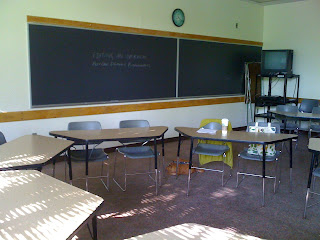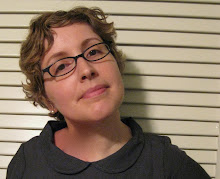
When we last left moi, I'd enjoyed my teaching gigs at Rhode Island College and Lesley University, and was preparing to depart for my very first writing retreat.
Of course, I've attended retreats in the past. But this was my first experience in attending one as a writer, and not an editor. I must admit, I was a little bit nervous about the whole thing at first, especially when I saw the impressive roster of attendees. Would I find a way to fit in with these brilliant authors? I wondered. Or would I feel like a complete impostor? And most important, would I be able to get any work done?
I was pretty nervous about the work part. At that point, I had about forty pages completed of my first draft, and while I liked what I'd written so far, I'd been away from the story for a while, and was worried that I wouldn't be able to recapture the same level of breathless, miraculous creative energy I'd felt in writing those first chapters. I worried that what I'd write would be serviceable, but not up to the same standards. As I've been doing a lot of work on my house lately, I can equate it to painting half a room with one can of paint, then finishing the other half with a different can of the same color; the final product is often close, but not an exact match. So I went into the experience with one goal in mind: to write ten pages. I felt confident that I could at least make that happen, and of course, I didn't stipulate whether or not they had to be ten good pages.
Thankfully, the experience started off with a long car ride with a friend. I love a road trip, especially when the following elements are on-hand: good conversation, good music, beautiful weather, breathtaking scenery, and a fast food pit stop. In this case, it was check, check, check, check, and check. By the time we arrived, I was already exhilarated and inspired.
The retreat center was, in a word, gorgeous. (Photo above of the view from the porch just outside my room.) And our
gracious co-hosts thought of everything — when we arrived, we were given paper and pens, chocolate, and a wine glass.
What, no wine? you ask. Oh, you just wait. As the other attendees arrived, we all situated ourselves in our rooms, then met on the second-floor deck for a meet-and-greet, where we enjoyed snacks and wine (finally!) and a make-your-own-wine-charm station! I used alphabet beads to make mine, which spelled out JUST WRITE.
But that was the least of my charming experiences. Throughout the afternoon and evening, I spent time meeting and chatting with my fellow retreaters, all of whom were beyond lovely and amazing. I felt infused with creativity and goodwill (and more than a little vino), and so, after dinner, I found myself a comfy seat on that back porch, a view of Lake Champlain before me, and I started to write.
What I wrote, unfortunately, was terrible.
The next morning, I would not be daunted by the experience; I decided to write through it. I didn't go back into my story at first, but instead did some journaling about the bad experience I'd had the night before, which led me to spend some time writing out some character studies. I realized that in the time I'd spent apart from my story, I'd lost touch with my characters; that's why my reunion with them the night before had been so awkward. As soon as I figured that out, I was back on track, and this time, the writing came easier. Still, it wasn't as magical as it had been during that initial forty-page frenzy, but I was moving forward. I just kept telling myself not to feel discouraged, that I just needed to keep writing, that whatever was imperfect about the story could be set right eventually. Slowly, slowly I went, and before I knew it, I was ten pages ahead. I made sure to journal again, because I find it just important to write about the high points in my process as it is to recount the low points.
In between, there was great food. And coffee. And conversation. And more great food. And then, more wine, along with a recounting of all we'd accomplished that day, complete with celebratory leis. (Insert joke about getting lei-ed here.) When it was announced that there would be a reading after dinner by those who were willing, my initial reaction was that I'd opt out. But I came to the eventual conclusion that I needed to read, that this first retreat experience would not be complete for me without writing and sharing my work with others. I needed to be brave.
I needed a barf bag and an oxygen tank or some combination of the two at first, when I found myself in front of the mike. But as I started reading from those first chapters, I was reminded of how much fun they were to write; it turned out they were just as much fun to read. And my audience, my fellow writers, my friends, were enjoying it, too. Really, I think the boost of confidence that reading (and the response to it) gave me was both the last thing I expected and the very thing I needed. Because when I returned home and finally went back into the story, that positive feedback helped to move me forward.
In fact, just a few weeks later, I was faced with something truly surprising: a finished first draft. Once I got past the halfway point of the story, I wrote a rough ending, which served as the light of the end of the tunnel. Then I sequestered myself in my room with a pot of coffee and some classical music, and went at it; five hours later, I was done, and experiencing a combination of shock, euphoria, and over-caffeination.
Many thanks to my fellow attendees at the retreat, Swinger of Birches, for being so welcoming and inspiring. You helped me to feel like a real writer. And that helped me to act like one.










